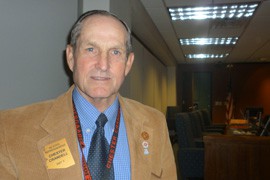Cronkite News has moved to a new home at cronkitenews.azpbs.org. Use this site to search archives from 2011 to May 2015. You can search the new site for current stories.
Lawmaker: Have voter-approved measures face reauthorization
PHOENIX – In 1998, Arizona voters decided to bar the Legislature from making changes to initiatives and referendums without a three–quarters vote in each house.
For all intents and purposes, a state lawmaker contends, that means some voter–approved measures committing money to particular uses will stay in place after they no longer serve the public good.
“There’s a lot of initiatives and things that have been passed that we’ve been collecting money for, and I’m not sure that they’re meeting the same needs,” said Rep. Chester Crandell, R–Heber.
Crandell has proposed that any voter-approved measure using public funds later face reauthorization votes by the public.
HCR 2005, which would refer the matter to the general election ballot, received an endorsement Thursday, Feb. 9, on a 6-3 party-line vote by the House Judiciary Committee.
Crandell said lawmakers need flexibility in case initiatives don’t achieve what was intended.
“The Legislature right now has no control over whether they stay or whether they don’t,” he said.
The resolution would require that all voter–approved statewide measures involving money be returned to the ballot after five fiscal years. If voters reauthorize a measure, it would face another vote after six years.
An independent audit report with recommendations would be issued to voters at least 60 days before an election.
Crandell’s measure would cover initiatives and referendums back to 1998. Those already on the books would face reauthorization votes in stages beginning in 2014.
SCR 1031, authored by Sen. Frank Antenori, R–Vail, would accomplish the same goal, though with slightly different time periods. It had yet to be scheduled for a committee hearing.
Rep. John Kavanagh, R–Fountain Hills, who is chairman of the House Appropriations Committee, said he supports the idea of subjecting initiatives and referendums involving money to reauthorization by voters but doesn’t think the public would go for it.
“Voters tend to be a bit pessimistic about things that come out of the Legislature,” he said.
Sandy Bahr, director of the Sierra Club’s Grand Canyon Chapter, called the resolution a “backdoor” way to avoid openly opposing particular measures approved by voters. The public and lawmakers already have the option of putting forward initiatives or referendums to repeal measures, she noted.
“If there’s a specific measure that they want to re–refer, they should do it and own up to it,” she said.
Zachary A. Smith, a regents’ professor at Northern Arizona University’s Department of Politics and International Affairs, said the underlying purpose of the resolution is persuading voters to overturn measures. It also would hurt the original supporters of a measure because they would have to mount another campaign to defend it, he said.
“The public has voted and decided what they want,” he said. “Now they have to go back and look at it again just because the Legislature doesn’t like it.”
Crandell said the change wouldn’t reduce the security of voter choices.
“It takes it out of the hands of the state Legislature,” he said. “The people are the ones that are going to have to make that decision.”







